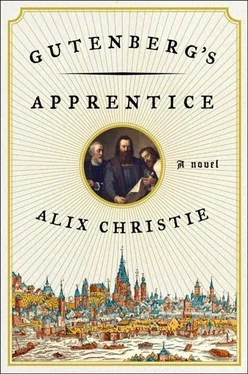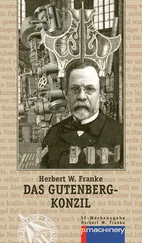Stepping on the market boat at Strassburg, he tried to calm his mind — just wipe it clean, the way he’d scrape and chalk a parchment. He’d learned this discipline from monks some years before: to steady first his breath, his pulse, and then his fingers and his eyes, to join the text he copied and his nib in one taut line. At least it was a blessing to escape that stinking, jolting coach. He gripped the railing, filled his lungs, and faced downstream.
The ship was weighted low with cargo; passengers who had no railing clung to staves nailed to the central hold. They were mere specks upon the river rushing toward the sea. The vessel pitched and rolled, and he could feel the shiver of that mighty force beneath his feet. The river seemed to fling him backward, down, with every bend that hauled him closer to his home.
When he was young, he’d thought the Rhine ships looked like ladies’ slippers: flat and low along the prow, then rising aft to curl like some outlandish petal at the captain’s back. He’d been a boy the last time he saw these shores. Yet he returned now as a man — a man of letters, a clericus , a scribe. He bore the tools of his profession in a pouch slung like a quiver at his side: the sealed horn of ink, his quills and reeds, his bone and chalk and chamois.
The valley of the Rhine peeled off to either side in banks of green and gold, and farther up outcroppings rose, perched high above the river like so many gnomes. An ancient peaty smell mingled sickeningly with the pomades and the late-September sweat of bodies crammed together at the rail. All he knew was that the matter was urgent. His father would not have called him back to celebrate the birth of his new son, although a child this late in life was wondrous news. Nor was he likely to have picked Peter a wife. First get yourself established, Johann Fust had always said, and then you’ll have your choice of brides. The only clue lay in a postscript in his looping hand: I’ve met a most amazing man .
The Seine had smelled of chalk and stone, a sharp and thrilling city striving. The Rhine was wider, darker, rooted in the forest and the field. Peter breathed in its odor, the odor he had known most of his life. They were not far from Gernsheim now, where he’d been born and raised and tended sheep. Where he’d been orphaned, and then saved. Fleetingly he saw the farm, and Father Paul. He never would forget the old priest’s palsied paw, and then his own small fist, tracing out his letters in fulfilment of his mother’s dying wish. He looked down at that very hand clamped now upon the railing — that hand that was the master of a dozen scripts. It was a perfect tool: with it he stood, at the Sorbonne, right at the apex of the world.
And what a world it was! Even decades later he could taste the feeling of that year of Jubilee. The Holy Roman Empire pulsed like a rich man with a fever, fearful yet exalted at the prospect of the light. All Christendom hung in the balance, waiting. There was a new pope on Saint Peter’s throne, and some strange new spirit rising. The schism of three popes had been laid to rest; the cardinals had bowed at last to the authority of Rome. The new Italian pontiff, Nicholas V, had vowed to sweep the vile world clean. He’d called his Jubilee to bring the faithful back to penitence, and undo years of plunder, ruled by greed.
That new wind was sweeping through the markets and the lecture halls, the streets and seats of learning from Bologna up to Paris. It licked around the stools where new men labored at their quills, copying the texts that fed the best minds in the western world. That wind had swept in masses of new students, lifted by prosperity and trade, all avid for their chance; it threw the scribes together in long ranks, writing madly to keep up with the demand. He’d felt the force of it up his own arm, lifting his eyes to heights he’d never dreamed, for he was one of these new men, these scholar-scribes.
And then the wind stalled, stopped short by the thick brown band of the Rhine. Peter watched the other trading boats, as thick as krill upon the water. Merchants, moneylenders, bureaucrats, and priests, all servants of Mammon as much as of God. He knew for certain that the winds of change were dead upon these shores when in the afternoon their boat put in to Speyer. He hung back when the passengers leapt off; he’d spied some merchants friendly with his father he would have to greet if he were seen. Instead he hung about the pilings, watching as the docker swung the crane and dug it deep into the bank.
He’d brought only what little he could carry, including a new manuscript of Cicero he had just started when the summons came. The rest he’d left behind in Paris as a kind of charm. His father could not mean he had to stay in Mainz. Not after all that Peter had achieved: his rapid rise through the ranks, his luck at being chosen not a month before to represent the workshop to the rector of the university. He wrote these extra books at night, to earn the coins for things his father’s stipend did not cover and he’d rather not reveal. The manuscript, and ten blank sets of pages, he had packed inside a barrel from the family trading firm. Cicero, On Moral Duties . Oh, the parallel was rich: the great man’s lectures to his son. It floated with him now, lashed to the others in the hold, the vellum snug inside its curly nest of shavings.
At least, that’s where he had last seen it stowed. Until, with shock, he saw his small brown cask tossed up and lashed onto the massive hook that swung the goods to shore. He leapt and shouted, waved his arms. The docker hauled on the rope. The barrel bore the mark of Mainz, he grunted. And no goods could transit in or out of Mainz these past three weeks, since the archbishop slapped the city with the unholy ban.
“What ban?” His father’s friends were at his back then, breathing sourly. “Leave it,” Widder hissed, “or you will never see it back.” The barrel branded “Brothers Fust” sailed slowly through the sky. “Don’t get much news, I guess, up there in Paris?” An elbow dug into his side. Excommunication was Archbishop Dietrich’s favorite means of brandishing his fist; he would shut a city in his diocese for weeks and sometimes months if local councils tried to cut into his power or his revenues.
The captain blew his whistle and the passengers all piled back on, propelling Peter forward on that rank and jostling tide. He was wedged in, hauled back, no better than a shipping cask. Three years he’d been away, by God, and not a bloody thing had changed.
As they gained speed, he prayed that he might soon escape this spent and feuding place. He bent his body with the current as the river coiled itself past Gernsheim, looped three times like some gigantic spring, then shot the boat that bore him up the few remaining miles.
The city looked the same. Not battered in the least, though he had heard enough in transit to conclude that Mainz was in extremis. She still stood proud upon the bank, an island girded by a high white wall, tipped red and blue as if by an illuminator’s brush. The ship moved slowly past the vineyards of the abbeys that encroached upon her southern door like fattened bishops. Across the river to the right, a smaller, muddy mouth drained from the Hessian plain. The cathedral city of the archbishopric of Mainz sat just astride the confluence of Rhine and Main.
The foreshore that late afternoon seemed drained of life. Out of instinct Peter raised his eyes to check the color of the sky. The Iron Gate would soon be shut. The day’s last stream of men and carts was toiling up the rocks, and he scrambled to join in, feet sinking into brackish sand. Up close the mighty wall was flaking, puckered at the massive hinges like a toothless hag. Beneath the arch he kissed his palm and touched it to the city seal. A dogleg left and right, and he was on the square they called the Brand, and home.
Читать дальше












